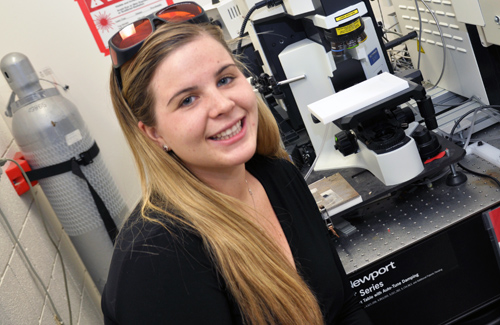
Working at a nuclear research institute for eight months isn’t your typical co-op placement, but for Katie Bissonette, a master’s student in chemistry, it gave her the opportunity to gain real-world experience.
“I looked at programs in Ontario where I could get relevant job experience and a master’s at the same time,” says Bissonette. A few months before completing her undergrad at Laurentian University, she approached chemistry professor Peter Tremaine at U of G, who later became her supervisor, about potential co-op opportunities at the graduate level.
She became the first student in 10 years to enrol in U of G’s co-op chemistry M.Sc. program, one of only a few in Canada that provide co-op work experience to graduate students. Tremaine paired Bissonette with Dave Guzonas, principal chemist at the Atomic Energy of Canada Ltd. (AECL) in Deep River, Ont.
During her co-op term at AECL’s Chalk River Laboratories, Bissonette conducted experiments to determine how materials corrode in water at temperatures far above those found in the current generation of nuclear reactors. Although the materials she tested weren’t candidates for use in the next generation of nuclear reactors, she says, “just to be able to understand how they corrode will help us in identifying better materials for such extreme conditions.”
The experiments consisted of placing several types of sample materials in water at high temperatures and pressure in a static autoclave for three weeks at a time. Similar experiments will be used to determine which materials are suitable for future nuclear reactors, but these candidate materials will need to be tested for up to a year, says Bissonette.
The CANDU supercritical water-cooled reactor concept is designed to be more efficient than current water-cooled reactors because it will operate at much higher temperatures, but that can take a toll on the reactor’s components.
“When we’re looking at materials and water chemistry at these temperatures, we have to make sure there’s no deposition of contaminants in the turbine,” says Bissonette.
In 2012, Tremaine and his research group received more than $900,000 in grants over four years as part of Canada’s contribution to an international program to develop the Generation IV supercritical water-cooled reactor.